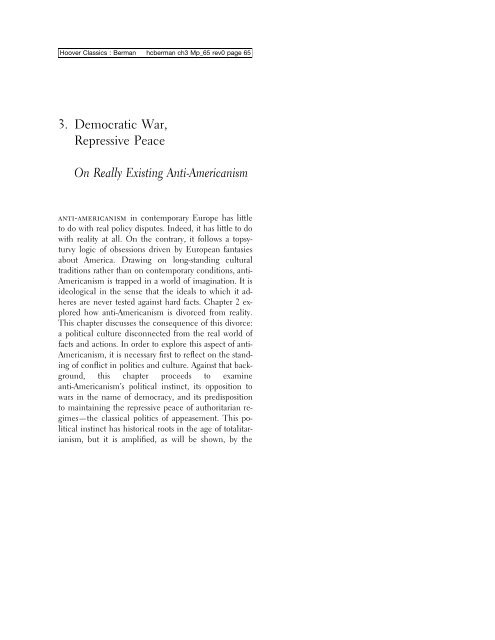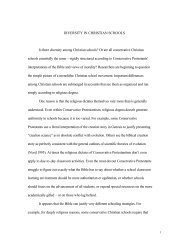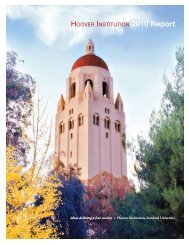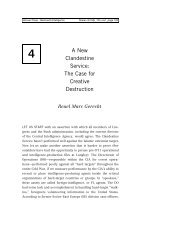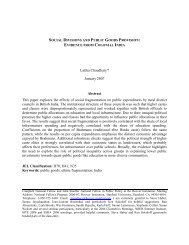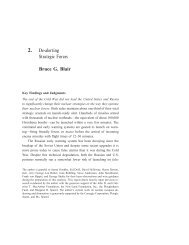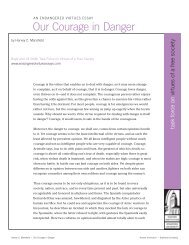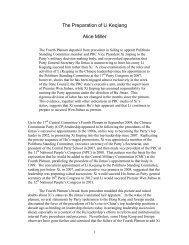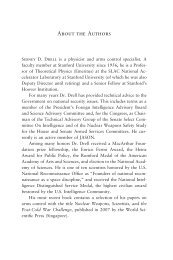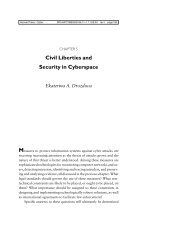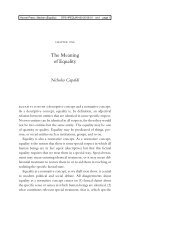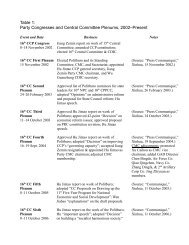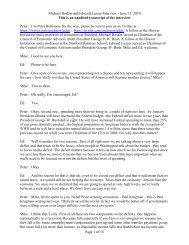On Really Existing Anti-Americanism - Hoover Institution
On Really Existing Anti-Americanism - Hoover Institution
On Really Existing Anti-Americanism - Hoover Institution
You also want an ePaper? Increase the reach of your titles
YUMPU automatically turns print PDFs into web optimized ePapers that Google loves.
<strong>Hoover</strong> Classics : Berman hcberman ch3 Mp_65 rev0 page 65<br />
3. Democratic War,<br />
Repressive Peace<br />
<strong>On</strong> <strong>Really</strong> <strong>Existing</strong> <strong>Anti</strong>-<strong>Americanism</strong><br />
anti-americanism in contemporary Europe has little<br />
to do with real policy disputes. Indeed, it has little to do<br />
with reality at all. <strong>On</strong> the contrary, it follows a topsyturvy<br />
logic of obsessions driven by European fantasies<br />
about America. Drawing on long-standing cultural<br />
traditions rather than on contemporary conditions, anti-<br />
<strong>Americanism</strong> is trapped in a world of imagination. It is<br />
ideological in the sense that the ideals to which it adheres<br />
are never tested against hard facts. Chapter 2 explored<br />
how anti-<strong>Americanism</strong> is divorced from reality.<br />
This chapter discusses the consequence of this divorce:<br />
a political culture disconnected from the real world of<br />
facts and actions. In order to explore this aspect of anti-<br />
<strong>Americanism</strong>, it is necessary first to reflect on the standing<br />
of conflict in politics and culture. Against that background,<br />
this chapter proceeds to examine<br />
anti-<strong>Americanism</strong>’s political instinct, its opposition to<br />
wars in the name of democracy, and its predisposition<br />
to maintaining the repressive peace of authoritarian regimes—the<br />
classical politics of appeasement. This political<br />
instinct has historical roots in the age of totalitarianism,<br />
but it is amplified, as will be shown, by the
<strong>Hoover</strong> Classics : Berman hcberman ch3 Mp_66 rev0 page 66<br />
66 <strong>Anti</strong>-<strong>Americanism</strong> in Europe<br />
pursuit of an emerging European identity: the real voice<br />
behind the curtain of the anti-American Oz.<br />
conflict: real and imaginary<br />
Politics typically involves conflicting interests, be it a<br />
matter of competition among individuals, parties, or<br />
states. The opposition of friend and foe in the international<br />
arena can grow into an enmity that takes the form<br />
of a dramatic scene, a confrontational face-off of two<br />
opponents. Accusation, recrimination, and attack unfold<br />
on the stage of doubled adversariness. It is doubled because<br />
the initial carrier of enmity, one side in the dispute,<br />
projects hostility on to the other, presuming that<br />
the opponent maintains a symmetrical counterview.<br />
The participant in the relationship of enmity assumes<br />
that the hostility is equally shared by the opponent. The<br />
drama of conflicting relations is therefore normally assumed<br />
to be a symmetrical arrangement.<br />
Political theory offers alternative characterizations<br />
of conflict: either as an inescapable “state of nature,” as<br />
an existential and irreducible struggle between irreconcilable<br />
foes, or as a precondition to an equally dramatic<br />
consensus-formation in a public sphere oriented toward<br />
compromise. The former model describes permanent<br />
war; the latter, the pursuit of a perpetual peace. As different<br />
as these outcomes are, the two alternatives and<br />
the gradations between them share an assumption: the<br />
substantiality of the opposition (i.e., the suggestion that<br />
a real, existence-defining conflict of interests underlies<br />
the hostility, whether the interests are religious or ma-
<strong>Hoover</strong> Classics : Berman hcberman ch3 Mp_67 rev0 page 67<br />
<strong>Really</strong> <strong>Existing</strong> <strong>Anti</strong>-<strong>Americanism</strong><br />
67<br />
terial, cultural or economic). In such a framework, enmity<br />
is understood to be the expression of conflict between<br />
genuine opponents. Real-world differences are<br />
presumed to be the underlying cause of political struggle.<br />
Yet it is worth considering another sort of case,<br />
where conflict is not symmetrical in this sense and<br />
where prior or objective grounds are not the true cause<br />
of hostility. As was argued in chapter 2, anti-<strong>Americanism</strong><br />
in fact follows its own ideological logic rather than<br />
genuinely conflicting interests. It is a cultural phenomenon<br />
rather than a rational pursuit of policy. When hostility<br />
results from such internal processes rather than<br />
from external conditions, the insinuation that the opponent<br />
is driven by symmetrical enmity amounts to little<br />
more than a fiction. By inventing the other as the enemy,<br />
one in fact ascribes to the other the sentiments<br />
that are above all one’s own: I hate you so you must<br />
hate me. Yet in such a case, where the imputation of<br />
hostility is a fiction, the explanatory model of genuinely<br />
symmetrical enmity turns out to be wrong. It is now<br />
more a matter of an ideological strategy designed to justify<br />
hostility than an accurate description of an objective<br />
clash of interests. In contrast to the forms of hostility<br />
that result from a real-world interest conflict, other forms<br />
are the consequence of solely endogenous processes, all<br />
on one side of the conflict. This asymmetrical model<br />
requires an alternative explanation.<br />
A primary anger in one party turns into anger at the<br />
world and only then finds its target. This hostility should<br />
be judged not as a response to what the opponent may
<strong>Hoover</strong> Classics : Berman hcberman ch3 Mp_68 rev0 page 68<br />
68 <strong>Anti</strong>-<strong>Americanism</strong> in Europe<br />
have done, since the opponent is only a belated discovery.<br />
This sort of hostility, on the contrary, is an expression<br />
of an internal cultural or psychological process that<br />
requires the invention of a threat: an imagined enemy<br />
representing the fictive danger required to sustain a troubled<br />
identity. The image of the enemy is not the result<br />
of a real opposition but acts instead as a mechanism to<br />
confirm the identity of the group. The enemy, in this<br />
sense, is just a scapegoat, and the vilification of the<br />
scapegoat confirms the cohesion of the community. The<br />
discourse of enmity, the sharply contoured external-oriented<br />
narrative of hostility, turns out to be largely internally<br />
driven; rather than describing an external world, it<br />
plays a role in the construction of identity. Hostility, in<br />
such cases, is not about the enemy but about the self.<br />
It involves an animus that predates the encounter with<br />
the presumed enemy. Instead of a model in which a<br />
real opponent elicits a hostile response, there is an internally<br />
generated anger, which only subsequently finds<br />
an object to oppose. This is the case for European anti-<br />
<strong>Americanism</strong>: it is not a matter of a plausible response<br />
to a real threat but rather the construction of an external<br />
enemy in order to maintain the coherence of an identity<br />
for Europe.<br />
This argument concerning an endogenous or subjective<br />
hostility is not meant to pertain to all conflicts.<br />
In other cases, tragedy and opposition do exist and lead<br />
to real-world struggle. Here, however, it is a matter of<br />
conflicts that are primarily subjective, driven by the internal<br />
logic of a cultural or psychological need to find<br />
an opponent, rather than by a confrontation with a par-
<strong>Hoover</strong> Classics : Berman hcberman ch3 Mp_69 rev0 page 69<br />
<strong>Really</strong> <strong>Existing</strong> <strong>Anti</strong>-<strong>Americanism</strong><br />
69<br />
ticular opponent in an objective competition for a specific<br />
good. In the case of a subjective hostility, the passion<br />
of belligerence, be it on the individual or collective<br />
level, is ultimately separate from and prior to the choice<br />
of the target of vilification. In political propaganda, this<br />
is precisely the dynamic that George Orwell described<br />
so masterfully in 1984: mass sentiment would be channeled<br />
into hatred for ever-shifting opponents for reasons<br />
that had little to do with those opponents and everything<br />
to do with ensuring the stability of the totalitarian political<br />
culture. Hatred becomes a free-floating instinct,<br />
available for redirection toward whatever object is most<br />
expedient. The ritual denunciation of the opponent may<br />
refer to distant circumstances, but it serves a purpose<br />
closer to home. It has ultimately nothing to do with the<br />
vilified opponent’s real existence, about which it prefers<br />
to remain largely ignorant and uninformed. Because it<br />
depends on this distance from and denial of facts, this<br />
sort of mind-set unleashes a continuing process of reality<br />
loss. The drama of enmity is therefore false drama, as<br />
we can explore in the case of current European anti-<br />
<strong>Americanism</strong>.<br />
the case of anti-americanism<br />
To say that European anti-<strong>Americanism</strong> lacks a genuinely<br />
dramatic scene means that it is not a reciprocal<br />
conflict between equal opponents. <strong>Anti</strong>-<strong>Americanism</strong><br />
cannot be explained as part of a mirror-image hostility.<br />
There is, to be sure, some diffuse blowback, moments<br />
of anti-European hostility in the United States, but it is
<strong>Hoover</strong> Classics : Berman hcberman ch3 Mp_70 rev0 page 70<br />
70 <strong>Anti</strong>-<strong>Americanism</strong> in Europe<br />
hardly ever on the scale of European anti-<strong>Americanism</strong>.<br />
The silly case of “freedom fries” is about as exciting as<br />
it gets: there are no anti-European demonstrations, no<br />
burnings of French or German flags, no angry mobs<br />
with pitchforks and tractors in front of Louis Vuitton<br />
boutiques or BMW dealerships. American “anti-Europeanism”<br />
is not an equal partner but only an anemic<br />
afterthought to the European spectacles.<br />
Europe is hardly a matter of regular concern for the<br />
American public, whereas the United States represents<br />
an object of constant obsession for the anti-American<br />
mind: an omnipresent and omnipotent opponent. The<br />
asymmetry is evident in the imbalanced structure of<br />
transatlantic name-calling. Former French foreign minister<br />
Hubert Vedrine’s complaint about the “simplistic”<br />
character of American foreign policy or German justice<br />
minister Herta Däubler-Gmelin’s blunder equating<br />
Bush and Hitler generated irritation and bemused curiosity<br />
in America, but these remarks quickly became<br />
yesterday’s news; in contrast, Donald Rumsfeld’s comment<br />
on old and new Europe elicited outrage and vitriol.<br />
A raw nerve had been touched, and European intellectuals<br />
showed themselves eager to be provoked by<br />
an American secretary of defense. Facing that real enemy,<br />
the non-European, old grudges melted away, and<br />
Jacques Derrida and Jürgen Habermas, philosophers on<br />
two sides of the Rhine who have spent their careers attacking<br />
each other, promptly marched shoulder to<br />
shoulder against the perceived American threat. Where<br />
sober criticisms of Rumsfeld or American defense policy<br />
might have been plausible, the heavy hitters of the Eur-
<strong>Hoover</strong> Classics : Berman hcberman ch3 Mp_71 rev0 page 71<br />
<strong>Really</strong> <strong>Existing</strong> <strong>Anti</strong>-<strong>Americanism</strong><br />
71<br />
opean spirit replied with the crude weapons of cultural<br />
denunciation and fantastic imagery that have characterized<br />
the anti-American mentality. 1<br />
<strong>Anti</strong>-<strong>Americanism</strong> is not a reasoned response to<br />
American policies; it is the hysterical surplus that goes<br />
beyond reason. That difference is evident in the constant<br />
recycling of anti-American images that have a history<br />
that long antedates current policy. The traditional<br />
European response to the new world and the United<br />
States has, for centuries, involved themes of savagery,<br />
violence, and excess power, as well as the anxieties generated<br />
by capitalism and democracy. 2 These stale images<br />
recur in the current discourse with stereotypical<br />
regularity. Yet if the animus predates the policy, then<br />
the policy is clearly not the cause but only the pretext,<br />
and the animus itself is prepolitical. Moreover, the obsessive<br />
mentality of anti-<strong>Americanism</strong> shows up in countries<br />
with very different experiences of the United States:<br />
Germany against the background of an occupation that<br />
was never perceived as a liberation (and certainly elicited<br />
no street celebrations), and France with the history<br />
of liberation but no occupation. Two different menus<br />
1. Cf. Jürgen Habermas, et al.,“Das alte Europa antwortet Herrn<br />
Rumsfeld,” Frankfurter Allgemeine Zeitung, January 24, 2003, 33.<br />
2. All this has been amply documented in various studies. Cf. Dan<br />
Diner, America in the Eyes of the Germans: An Essay on <strong>Anti</strong>-<strong>Americanism</strong>,<br />
trans. Allison Brown (Princeton: Markus Wiener, 1996); Philippe<br />
Roger, L’ennemi americain: Généalogie de l’antiaméricanisme français<br />
(Paris: Seuil, 2002); Susanne Zantop, Colonial Fantasies: Conquest, Family,<br />
and Nation in Precolonial Germany, 1770–1870 (Durham: Duke University<br />
Press, 1997).
<strong>Hoover</strong> Classics : Berman hcberman ch3 Mp_72 rev0 page 72<br />
72 <strong>Anti</strong>-<strong>Americanism</strong> in Europe<br />
leave the same taste in the mouth, as if the flavor had<br />
a life of its own.<br />
Yet this separation of the affect of enmity from hypothetically<br />
objective causes explains why the anti-<br />
American perception of the present is marked by the<br />
regular loss of factual grounding and a nearly hermetic<br />
imperviousness to events. Reality disappears. Hence the<br />
predisposition to disbelieve any reports of real American<br />
success in the Afghanistan or Iraq wars, to denounce<br />
pro-American Iraqis, and to exclude any information<br />
that does not fit into a narrowly constructed myth:<br />
“nothing can shake it in its inner certitude, because it<br />
is imprisoned in its safe world—because it is incapable<br />
of experiencing anything”—thus the literary critic<br />
Georg Lukács, writing nearly a century ago on the problem<br />
of “abstract idealism.” His characterization precisely<br />
fits the substance of the anti-American mentality. 3 In<br />
this vein, one has to count the willingness of the mainstream<br />
European media to treat the Iraqi information<br />
minister as a plausible source, until the very end, while<br />
at the same time directing an unrelenting skepticism<br />
toward any signs of coalition victory or Iraqi celebrations.<br />
Because the anti-Saddam Iraqis disappointed the<br />
European anti-Americans, it was claimed that they did<br />
not exist or, at best, were funded by Americans. This<br />
sort of fantastic thinking with regard to the Iraq war,<br />
however, involves the very same reality denial that char-<br />
3. Georg Lukács, The Theory of the Novel: A Historico-Philosophical<br />
Essay on the Forms of Great Epic Literature, trans. Anna Bostock (Cambridge:<br />
MIT Press, 1971), 99.
<strong>Hoover</strong> Classics : Berman hcberman ch3 Mp_73 rev0 page 73<br />
<strong>Really</strong> <strong>Existing</strong> <strong>Anti</strong>-<strong>Americanism</strong><br />
73<br />
acterized another episode, the response to the September<br />
11 attacks: the grotesque suggestions of hidden conspiracies<br />
or a mere media spectacle or—perhaps most<br />
common—the European notion that it was not that bad<br />
after all. Reality that does not match politically correct<br />
opinion cannot exist. Uncomfortable facts and uncomfortable<br />
opinions are equally disallowed. The sort of debate<br />
that has raged through the American public and<br />
press was just absent in much of Europe.<br />
For anti-<strong>Americanism</strong>, the issue is not facts, to<br />
which one might respond critically, but an obsession,<br />
an internally generated hostility, with no link to the real<br />
world. Hence the predilection to denial: the Iraqis are<br />
not celebrating, Al Qaeda did not attack the Twin Towers,<br />
the infidels are not in Baghdad.<br />
Because of this separation of ideology from reality,<br />
images take over, propagandistic targets of enmity, negatively<br />
charged icons. A telling case in point is the anti-<br />
American journalism of the Indian writer and activist<br />
Arundhati Roy. Obviously, Roy cannot be taken as an<br />
example of a typical European intellectual, but she has<br />
achieved a particular celebrity status in the European<br />
press, from the Manchester Guardian to the Frankfurter<br />
Allgemeine, which has published her anti-American essays.<br />
This prominence gives her writings a symptomatic<br />
significance (i.e., they can tell us something about the<br />
anti-American mentality).<br />
Roy’s style entails the rhetoric of antipathy, strings<br />
of stereotypical denunciations, devoid of reasoned argument<br />
and sprinkled with targets of hatred. It is, especially,<br />
a language that relies on derogatory personifi-
<strong>Hoover</strong> Classics : Berman hcberman ch3 Mp_74 rev0 page 74<br />
74 <strong>Anti</strong>-<strong>Americanism</strong> in Europe<br />
cations that serve to focus the reader’s hatred. In one<br />
essay, for example, she arbitrarily conjures up an otherwise<br />
unidentified “marrowy American panelist,” and<br />
in another she points with disgust at an equally anonymous<br />
figure “who rolls his R’s in his North American<br />
way.” 4 Neither of these figures plays any other role in<br />
her narratives, except to provide a negative image. Are<br />
they real people or merely invented? We never know,<br />
but Roy deploys these gratuitous fictions as objects of<br />
disdain, as if a marrowy physiognomy and a North<br />
American accent—rather than policy—were the true affront.<br />
Her writing will be discussed at greater length<br />
below in chapter 5 in relation to the anti-<strong>Americanism</strong><br />
of the movement against globalization.<br />
At this point, however, the concern is less Roy’s<br />
more elaborate ideology than the fact that she is celebrated<br />
in the anti-American press and what this tells us<br />
about the ideology of anti-<strong>Americanism</strong>. For example,<br />
in the opening of her essay on “Mesopotamia,” of April<br />
2, 2003, in the Manchester Guardian, she conjures up<br />
the “adolescent American soldiers [who] scrawl colorful<br />
messages in childish handwritings” on missiles, and she<br />
dwells with a sort of lascivious interest on one private<br />
she saw in a CNN interview who “stuck his teenage<br />
tongue all the way down to the end of his chin.” Her<br />
point is hardly sympathy with these “teenagers” who find<br />
themselves in a war—a plausible antiwar stance, concern<br />
for young people pulled into battlefield danger—<br />
4. Arundhati Roy, Power Politics (Cambridge: South End Press,<br />
2001), 36, 41.
<strong>Hoover</strong> Classics : Berman hcberman ch3 Mp_75 rev0 page 75<br />
<strong>Really</strong> <strong>Existing</strong> <strong>Anti</strong>-<strong>Americanism</strong><br />
75<br />
but rather an explicit contempt for Americans, described<br />
as infantile, and their silly teenage behavior: this, she<br />
suggests, is the face of the enemy. What she subsequently<br />
musters as pseudoargument in the course of her<br />
diatribe is only secondary to the imagistic vilification of<br />
the opponent, classical propaganda, couched in a rhetoric<br />
tailored for a European audience: Americans are<br />
unmannered and have poor penmanship. The Indian<br />
author appeals to the elitism of European anti-<strong>Americanism</strong><br />
that sees Americans as lacking culture.<br />
Her focus on the motif of penmanship—irrelevant<br />
to policy substance but loaded as a cultural stereotype—<br />
is symptomatic of the role of anti-<strong>Americanism</strong> in the<br />
mainstream European press. A critique of Iraq policy is<br />
surely possible, but there is a surplus here that goes beyond<br />
the ostensible political substance. It is apparently<br />
not the policy but the poor manners that matter. It is<br />
not the war that is the offense but the Americans themselves<br />
who are the real provocation to Roy’s sensibility<br />
and to that of her readers. Opposition to the war in Iraq<br />
is ultimately therefore interchangeable with opposition<br />
to all the other aspects of American foreign policy. Opposition<br />
to the war does not lead to anti-<strong>Americanism</strong>;<br />
rather anti-<strong>Americanism</strong>, the primary affect, elicits opposition<br />
to the war. Iraq is really just one more item on<br />
a party platform. If pushed, the anti-Americans might<br />
concede that Saddam, the Taliban, and Milosevic were<br />
not particularly laudable (although we should not underestimate<br />
the degree of pro-Saddam sympathy, especially<br />
in France), but they only became issues because<br />
of that American foreign policy. Or to parse this even
<strong>Hoover</strong> Classics : Berman hcberman ch3 Mp_76 rev0 page 76<br />
76 <strong>Anti</strong>-<strong>Americanism</strong> in Europe<br />
more closely: it is not what Americans do—since, in the<br />
end, most would be hard put to defend Milosevic, Saddam,<br />
and the rest—but the fact that it is Americans who<br />
act and not Europeans. It is therefore not European pacifism,<br />
a principled opposition to violence, that brings out<br />
the anti-American demonstrators but European passivity<br />
and an appeasement mentality that recoils at the American<br />
ability for action. The particular terrain where the<br />
action takes place becomes irrelevant. For the anti-<br />
American mind-set, the world—Iraq, Afghanistan, the<br />
Balkans—is always only a pretext, an emptied space, a<br />
blank sheet on which it tries to scrawl its own childish<br />
message: childish because incapable of political action.<br />
What provokes the anti-American is American activism:<br />
not that America plays a particular role in the<br />
world but that it is in the world at all. Whatever the<br />
American action, the anti-American denounces it, particularly<br />
when the action is couched in a policy of defending<br />
the freedom to act, which in turn implies a set<br />
of democratic values. The absence of freedom in particular<br />
locales—Iraq, Afghanistan, the Balkans—is typically<br />
of concern only for tiny nongovernmental organizations,<br />
not for mass protest movements, except when<br />
the United States intervenes. There were never mass<br />
demonstrations in Paris, Berlin, or Barcelona against<br />
Milosevic, the Taliban, or Saddam. There were never<br />
demonstrations for regime change. The mass protest<br />
movement only emerged when the authoritarian regime<br />
was challenged by the forces of democracy. Before the<br />
war, Iraq was noticed only because of the sanctions policy—an<br />
evil attributed to the United States—and never
<strong>Hoover</strong> Classics : Berman hcberman ch3 Mp_77 rev0 page 77<br />
<strong>Really</strong> <strong>Existing</strong> <strong>Anti</strong>-<strong>Americanism</strong><br />
77<br />
because of the regime’s character. In the context of the<br />
war, however, the anti-American movement finds itself<br />
objectively, and often enough explicitly, on the side of<br />
a dictator whom it had failed to criticize earlier; and it<br />
is therefore even more scandalized by the American invocation<br />
of democracy. The historical record shows that<br />
mass demonstrations in Western Europe in the twentieth<br />
century more often than not have involved direct or<br />
indirect support for authoritarian leaders in order to oppose<br />
the United States.<br />
This is an embarrassing political problem for the<br />
anti-American movement that pretends to be progressive<br />
but keeps waking up in bed with dictators. It shows willingness<br />
if not to celebrate, at least to tolerate, authoritarian<br />
regimes, no matter how brutal, in order to refrain<br />
from any association with capitalism, no matter how<br />
democratic. Any statism seems better than freedom if<br />
freedom means a free market. This willingness to rally<br />
around dictators and ignore the suffering in totalitarian<br />
regimes is an extraordinary feature of the political culture<br />
of Western Europe. Even after the demise of Communism,<br />
the Communist taboos hold sway, as does its<br />
irreparably damaged political culture. To be sure, anti-<br />
<strong>Americanism</strong> today is not primarily a matter of old-style<br />
Communism, but it is still stuck in the political culture<br />
of the Communist age. Old habits die hard. In fact, the<br />
moral hypocrisy of the anti-American movement remains<br />
hopelessly trapped in the classic scenario of political<br />
blackmail that defined the limits of criticism in<br />
the century of totalitarianism. The traumatic scene of<br />
the Hitler-Stalin pact—the willingness of the Left to fall
<strong>Hoover</strong> Classics : Berman hcberman ch3 Mp_78 rev0 page 78<br />
78 <strong>Anti</strong>-<strong>Americanism</strong> in Europe<br />
in line and oppose prospects for an antifascist war—<br />
continues to cast a long shadow on the possibility of<br />
political protest. It still promotes the sorry political formula:<br />
tolerance for an authoritarian peace, opposition<br />
to a democratic war. Hence the willingness to oppose<br />
regime change in Iraq: better to side, objectively, with<br />
Saddam Hussein than to support the American initiative<br />
for liberation. Peace at any price.<br />
brecht<br />
This remarkable willingness to side with miserable regimes<br />
in order to avoid supporting the democracy of the<br />
United States repeats the pattern of the left in the years<br />
1939 to 1941: the willingness to sacrifice substantive<br />
principles in the name of political expediency. It is useful<br />
therefore to turn back to that historical moment to<br />
see how one author in particular, the playwright Bertolt<br />
Brecht—a Marxist, close to the Communist movement,<br />
and an exile from Hitler’s Germany—viewed the political<br />
situation. Since he had every reason to fear the Nazi<br />
regime, the peace between the two totalitarian dictatorships<br />
could hold no appeal for him, despite his own<br />
Communist sympathies. Nonetheless, he had to overcome<br />
many predispositions, the political correctness of<br />
his day, before recognizing the possibility that the<br />
West—Western capitalist democracies and Great Britain<br />
in particular—was ultimately worth supporting as a<br />
potential opponent to Hitler.<br />
For a brief moment, the Marxist Brecht caught a<br />
glimpse of how capitalist democracy represented a more
<strong>Hoover</strong> Classics : Berman hcberman ch3 Mp_79 rev0 page 79<br />
<strong>Really</strong> <strong>Existing</strong> <strong>Anti</strong>-<strong>Americanism</strong><br />
79<br />
plausible opponent to Nazi totalitarianism than did the<br />
Communism of Stalinist Russia. In two passages in his<br />
journals, he managed to work his way out of the politically<br />
correct Stalinist antiwar stance, the toleration for<br />
repressive peace, and came to advocate the democratic<br />
war. Despite his standard leftist starting points—anticapitalist,<br />
antibourgeois, antinationalist, and antiwar—he<br />
was ultimately able to comprehend how a willingness to<br />
wage war, to celebrate national identity, and to cultivate<br />
patriotism were desirable, at least in the context of patriotism<br />
within a democracy and a war against fascism.<br />
To do so, to recognize where the best hope lay for fighting<br />
Hitler, required a profound shift in his political instinct<br />
to reject war as such. He had to venture out of<br />
the ideological confines of Communism and its abstract<br />
idealism to embrace instead the vision of a heroic engagement<br />
in the drama of struggle. In order to fight for<br />
freedom, he had to escape from dogma. Brecht’s successful,<br />
albeit brief, political opening provides a standard<br />
with which we can measure the ideological character of<br />
anti-<strong>Americanism</strong>.<br />
In Scandinavian exile from Hitler’s Germany,<br />
Brecht watched Europe collapse: “france fell at the maginot<br />
line, that underground 5-storey hotel, what an embodiment<br />
of parasitical french capital investment!”<br />
(journal entry of June 28, 1940). 5 After the French capitulation,<br />
would England fight? Brecht had his doubts,<br />
in the context of the Hitler-Stalin pact and the Com-<br />
5. Bertolt Brecht, Journals 1934–1955, trans. Hugh Rorrison (New<br />
York: Routledge, 1996), 71.
<strong>Hoover</strong> Classics : Berman hcberman ch3 Mp_80 rev0 page 80<br />
80 <strong>Anti</strong>-<strong>Americanism</strong> in Europe<br />
munist opposition to war. In fact, Brecht had his own<br />
inclinations to oppose both militarism and nationalism.<br />
After all, he had begun his writing career as a schoolboy<br />
during the First World War with an attack on the Roman<br />
poet Horace’s dulce et decorum est pro patria mori,<br />
the famous verse declaring that it is sweet and honorable<br />
to die for one’s homeland, and he was himself the author<br />
of the fiercely antiwar poem “Legend of the Dead<br />
Soldier.” Having witnessed the devastation that the First<br />
World War caused to Germany, especially to his generation,<br />
Brecht was inclined to an antiwar position and,<br />
even in the changed circumstances of 1940, he was an<br />
unlikely candidate to endorse the mission of the English<br />
army. Yet despite his pacifist leanings and despite the<br />
Stalinist tilt against war and against the Western democracies<br />
through the pact with Hitler, Brecht began<br />
to explore the prospect for British participation in a possible<br />
democratic war, even before the fall of France.<br />
These explorations involve two key points where war<br />
and literature overlap.<br />
Throughout Brecht’s oeuvre, the Anglo-American<br />
world carries negative associations of capitalism and<br />
crime, from the London of The Threepenny Opera to<br />
the Chicago of Arturo Ui, and of course the elegiac<br />
poetry of the exile years in Hollywood. These same<br />
terms of disparagement continue in contemporary anti-<br />
<strong>Americanism</strong>, so Brecht’s coming to grips with England<br />
can be taken as an alternative resolution of some of the<br />
same cultural problems: Brecht could come to embrace<br />
democratic England as a force against Hitler in a way<br />
that today’s anti-Americans refuse to support the United
<strong>Hoover</strong> Classics : Berman hcberman ch3 Mp_81 rev0 page 81<br />
<strong>Really</strong> <strong>Existing</strong> <strong>Anti</strong>-<strong>Americanism</strong><br />
81<br />
States in the war against Saddam Hussein. Of course,<br />
Brecht, who cultivated a tough-guy image, felt some affinity<br />
with the masculine brutality that he associated<br />
with England, but this predisposition stood increasingly<br />
under the ideological censor of standard anti-militarism<br />
and Communist dogma. Trying to come to grips with<br />
England, however, he gradually overcame this resistance,<br />
at least partially.<br />
In order to understand England, the writer Brecht,<br />
not surprisingly, read literature and history. In a remarkable<br />
journal entry of February 2, 1940, he reports on<br />
his reading Thomas Macaulay’s essay on the early eighteenth-century<br />
poet Joseph Addison. It is here that Brecht<br />
encounters the liberal revolutionary England, in the<br />
wake of the Glorious Revolution of 1688, with its burgeoning<br />
public sphere in which literature took on a<br />
prominent role. As Macaulay put it, “Now the press was<br />
free, and had begun to exercise unprecedented influence<br />
on the public mind. Parliament met annually and<br />
sat long. The chief power in the State had passed to the<br />
House of Commons. At such a conjuncture, it was natural<br />
that literary and oratorical talents should rise in<br />
value.” 6 It is hardly surprising that Brecht, the advocate<br />
of an engaged literature and a political theater, would<br />
find this cultural model appealing, in constrast to what<br />
Macaulay disparaged as the “servile literature of<br />
France,” 7 with its deep dependence on the power of the<br />
6. Thomas Babbington Macaulay, “The Life and Writings of Addison,”<br />
in Macaulay, Essays on Milton and Addison (New York: Longmans,<br />
Green, and Co., 1900), 112.<br />
7. Ibid., 115.
<strong>Hoover</strong> Classics : Berman hcberman ch3 Mp_82 rev0 page 82<br />
82 <strong>Anti</strong>-<strong>Americanism</strong> in Europe<br />
monarchy. Brecht concludes that English literature is<br />
strong “because a national life existed and the bourgeoisie<br />
came to power at an early stage” 8 —in contrast<br />
to German backwardness, without nationhood and without<br />
a national market. In other words, Brecht attributes<br />
the success of British literature to the vitality of nationhood<br />
and the energy of the market economy of the<br />
“bourgeoisie.” Those are certainly not the typical values<br />
associated with communism, and the Marxist Brecht immediately<br />
glosses his own remark with an expression of<br />
surprise and despair: “what criteria!” At odds with his<br />
past, he finds himself compelled to reconcile his admiration<br />
for the English cultural achievement with an<br />
initial distaste for the precondition of that same cultural<br />
success: liberal capitalism. For it is precisely that marketbased<br />
political economy that supported the culture<br />
that—Brecht reports—promoted technological progress<br />
and an empirical worldview and epistemology: German<br />
literature, he complains, is backward and idealistic,<br />
whereas British literature is up-to-date and engaged in<br />
the materiality of the real world.<br />
Brecht then proceeds to draw these points from the<br />
critical debate on Addison’s poem “Campaign,” which<br />
celebrated the Duke of Marlborough’s defeat of the<br />
French and Bavarian armies on August 13, 1704, at the<br />
Battle of Blenheim, a turning point in the War of Spanish<br />
Succession. The more literary his argument gets, the<br />
more pertinent it is for an analysis of political ideology.<br />
Thus, Brecht reports on how Dr. Johnson applauded<br />
8. Brecht, Journals 1934–1955, 69.
<strong>Hoover</strong> Classics : Berman hcberman ch3 Mp_83 rev0 page 83<br />
<strong>Really</strong> <strong>Existing</strong> <strong>Anti</strong>-<strong>Americanism</strong><br />
83<br />
Addison’s use of concrete metaphors as exemplifying the<br />
advantage of the particular over the general: instead of<br />
bland generalizations or abstract connections, the comparisons<br />
are apt and grounded in reality. For Brecht, this<br />
concreteness of Addison’s language and thought is tied<br />
to a model of heroic individualism: the hero who acts<br />
in the real world, instead of losing himself in cloudy<br />
vagueness. Addison’s praise poem of Marlborough’s military<br />
success is therefore simultaneously a celebration of<br />
the individualism of British liberty over the continental<br />
servitude of the absolutist French state. To cite Addison<br />
on Marlborough’s army:<br />
. . . with native freedom brave<br />
The meanest Briton scorns the highest slave. 9<br />
For Brecht reading Macaulay reading Addison, the<br />
eighteenth-century battle of modern Britain against<br />
monarchist France represents a precedent for what<br />
Brecht hopes would ensue: a campaign by Britain—and<br />
the United States—pursuing the values of liberty and<br />
freedom against the oppressiveness of the continent.<br />
German literature, in contrast, remains for Brecht effetely<br />
idealistic and underdeveloped, fundamentally unable<br />
to compete with the cultural revolution unleashed<br />
by the liberalizing dynamism of England.<br />
Yet Brecht remains hesitant: the values of freedom<br />
9. Joseph Addison, “The Campaign, A Poem to His Grace the Duke<br />
of Marlborough, 1705,” The Penn State Archive of Samuel Johnson’s Lives<br />
of the Poets, ed. Kathleen Nulton Kemmerer, http://www.hn.psu.edu/faculty/kkemmerer/poets/addison/campaign.htm.
<strong>Hoover</strong> Classics : Berman hcberman ch3 Mp_84 rev0 page 84<br />
84 <strong>Anti</strong>-<strong>Americanism</strong> in Europe<br />
and capitalism, nationhood and military strength are<br />
tough medicine for him to swallow, burdened as he is<br />
with his Communist loyalties and Central European<br />
pessimism. However, the February journal entry on Macaulay<br />
still preceded the fall of France. <strong>On</strong>ce the Germans<br />
were in Paris, suddenly the Nazi threat loomed<br />
much larger, and by August we find him struggling<br />
again with his own resistance and hesitations. He reports<br />
that he has “skimmed” 10 Matthew Arnold’s edition of<br />
Wordsworth—his underlining the brevity of his reading<br />
betrays an embarrassment to have to admit that he has<br />
been reading this presumably conservative literature—<br />
but he pushes immediately to the conclusion that it is<br />
dangerous “to lay down the law,” which, in this context,<br />
means to condemn this literature as “petty bourgeois”:<br />
the dogmatic judgment his Marxist aesthetic would<br />
most likely have reserved for Wordsworth’s poem “She<br />
Was a Phantom of Delight.” In other words, Brecht is<br />
announcing that the standard Marxist ideological rejection<br />
is wrong.<br />
As Robert Kaufman has shown, Brecht works out<br />
his own aesthetic agenda here; 11 but he is also working<br />
out a politics, a willingness to accept the progressive<br />
character of a democratic capitalist culture personified<br />
by the British citizen-soldier in wartime: “the individual<br />
petty bourgeois currently patrolling the fields of england<br />
equipped with a shotgun and a molotov cocktail (‘as<br />
10. Brecht, Journals 1934–1955, 90.<br />
11. Robert Kaufman, “Aura, Still,” October, no. 99 (Winter 2002),<br />
73–74, note 46.
<strong>Hoover</strong> Classics : Berman hcberman ch3 Mp_85 rev0 page 85<br />
<strong>Really</strong> <strong>Existing</strong> <strong>Anti</strong>-<strong>Americanism</strong><br />
85<br />
used against tanks in the spanish civil war,’ so a general<br />
assured us on the wireless).” 12 Whom does the Marxist<br />
Brecht celebrate here? It is not a mythic proletarian revolutionary<br />
or a Communist cadre but the really existing<br />
citizen of a capitalist bourgeois society, who, moreover,<br />
carries the emblem of the antifascist fight, a weapon<br />
from the Spanish Civil War. But if this democratic and<br />
capitalist society has, as Brecht insists, a claim on a poetry<br />
that can “conjure up situations more worthy of the<br />
human race,” he has effectively retracted his youthful<br />
attack on Horace: it is, so it turns out in the summer of<br />
1940, proper to fight for one’s country, and poetry can<br />
provide sweet comfort. Brecht has moved from support<br />
for the repressive peace to approval of a war fought for<br />
democracy.<br />
Brecht goes on to comment on the poem at hand,<br />
Wordsworth’s “Phantom of Delight.” He distances himself<br />
from Wordsworth’s suggestion that art serves only<br />
“to haunt, to startle, and to waylay.” While Wordsworth<br />
seems to suggest that a poem is only about romantic<br />
beauty, Brecht calls for poetry to do more. Nonetheless,<br />
his comments follow the movement of the poem, which<br />
makes its way from a ghostly “apparition” or “phantom”<br />
to the recognition of reality and then from reality to an<br />
affiliation of art and freedom, or in Wordsworth’s words:<br />
“Her household motions, light and free, / And steps of<br />
virgin liberty.” Tracing the movement of the ideal apparition<br />
to the material embodiment of lived life,<br />
Wordsworth’s poem in fact even goes beyond Brecht’s<br />
12. Brecht, Journals 1934–1955, 91.
<strong>Hoover</strong> Classics : Berman hcberman ch3 Mp_86 rev0 page 86<br />
86 <strong>Anti</strong>-<strong>Americanism</strong> in Europe<br />
own materialism, beating him at his own game:—unless<br />
one reads Brecht’s meditation on the urgency of poetry<br />
for the soldier in the field as a commentary on the<br />
poem’s telos. It was, one can conclude, a Wordsworthian<br />
“virgin liberty” that had fought in Catalonia, and<br />
so Brecht hopes, the same spirit of liberty will rally to<br />
defend England. Making freedom real is the beautiful:<br />
an aesthetic proposition where Brecht and Wordsworth,<br />
the Communist and the romantic, overlap.<br />
Brecht’s engagement with English literature has<br />
multiple components: autonomy, aesthetics, individualism,<br />
the mercantile ethos of capitalism, and the heroic<br />
ethos of war. Facing the danger posed by the authoritarian<br />
state on the continent, Brecht turned to the alternative:<br />
the parliamentary England of Addison’s day<br />
that challenged Bourbon domination of the continent<br />
around 1700, and, a century later, Wordsworth’s England<br />
of 1800 that defeated Napoleonic imperialism.<br />
Would the English-speaking world similarly withstand<br />
the Nazi threat of Hitler’s Festung Europa, “fortress Europe”?<br />
Analyzing the British culture that could support<br />
the democratic wars—the poetry of Addison and Wordsworth—Brecht<br />
comes to admire it, even if he would<br />
never make it fully his own. Nonetheless, for the moment<br />
of 1940 at least, he could overcome his illiberal<br />
predispositions and express esteem for the democratic<br />
petty bourgeoisie, hoping that British capitalism would<br />
be able to live up to its historical legacy and act against<br />
fascism. His admiration for the soldier in the field, radiant<br />
with the aura of Wordsworth and the legitimacy<br />
of antifascism, is the diametrical opposite of Roy’s dis-
<strong>Hoover</strong> Classics : Berman hcberman ch3 Mp_87 rev0 page 87<br />
<strong>Really</strong> <strong>Existing</strong> <strong>Anti</strong>-<strong>Americanism</strong><br />
87<br />
dain for the democratic soldier, with his childish scrawl<br />
and bad manners. The passages show Brecht working<br />
toward a rapprochement with the liberal institutions of<br />
England and the emancipatory character of bourgeois,<br />
which is to say, capitalist, life: for this same substance,<br />
shifted to the United States, today’s anti-American only<br />
has contempt.<br />
anti-americanism: a european ideology<br />
Is anti-<strong>Americanism</strong> an endogenous formation, the consequence<br />
of internal European cultural processes, or<br />
does it reflect genuine differences between Europe and<br />
the United States? This chapter began exploring the first<br />
model, according to which the enemy is understood to<br />
be a retroactive construction, necessary for the constitution<br />
of an identity. It followed that anti-<strong>Americanism</strong><br />
had little to do with reality, or with real conflicts, and<br />
much more to do with cultural traditions and stereotypes.<br />
Yet Brecht’s reflections of 1940 suggest an alternative<br />
account. At a particular point in history, he was<br />
able to shift loyalties from one culture to another, from<br />
continental ideologies of dogma to British liberalism<br />
and liberty. For all his Central European illiberalism<br />
(which is shared by today’s European anti-American<br />
movements), he nonetheless imagined a personal rapprochement<br />
with the enemy, the culture across the<br />
channel. Brecht, the son of Augsburg, accepted Marlborough’s<br />
victory at Blenheim and all that that implied—parliamentary<br />
ascendancy, commercial culture,<br />
military prowess as a progressive force, and, ultimately,
<strong>Hoover</strong> Classics : Berman hcberman ch3 Mp_88 rev0 page 88<br />
88 <strong>Anti</strong>-<strong>Americanism</strong> in Europe<br />
autonomy aesthetics. This was no longer a one-sided<br />
story but a clash of civilizations; on the one hand, a<br />
“servile literature,” 13 associated with the authoritarian<br />
states of the continent, and on the other, a democratic<br />
civic life prepared to defend itself. Brecht locates this<br />
militant democracy in English culture; it is the same<br />
Anglo-American culture that is the target of the anti-<br />
American mentality.<br />
Yet these two explanations seem to be mutually incompatible:<br />
either anti-<strong>Americanism</strong> is the product of<br />
its own internal ideological fantasies or it is the effect of<br />
real differences between Europe and the United States.<br />
The model of an animus driven by internal concerns<br />
and therefore characterized by the loss of external reality<br />
would presumably exclude the thesis of a real-world distinction<br />
between the cultures of the Atlantic and the<br />
continent, between commercial parliamentarianism on<br />
the one hand and regulatory regimes of state authority<br />
on the other. If there is indeed a conflict between these<br />
two orders—with social, cultural, and political implications—then<br />
it is less obvious that the animus is merely<br />
the expression of an independent instinct. So we face<br />
again the alternative between explanatory models for<br />
European anti-American hostility as either symmetrical<br />
or asymmetrical.<br />
When anti-<strong>Americanism</strong> claims to be a response to<br />
specific American policies, it fits the dramatic model:<br />
policy conflict produces hostility. Yet, as we have seen,<br />
this self-presentation in fact typically invokes American<br />
13. Macaulay, Life and Writings of Addison, 115.
<strong>Hoover</strong> Classics : Berman hcberman ch3 Mp_89 rev0 page 89<br />
<strong>Really</strong> <strong>Existing</strong> <strong>Anti</strong>-<strong>Americanism</strong><br />
89<br />
policy only as a pretext. Too many features of anti-<strong>Americanism</strong><br />
as a rhetorical and cultural phenomenon call<br />
this dramatic explanation into question. At best, it dwindles<br />
into a matter of lyric drama, just so much fantasy<br />
and fairy tale. In this sense, it is telling that European<br />
anti-<strong>Americanism</strong> succumbs repeatedly to its own tales<br />
of Arabian nights: the warning that American policy will<br />
ignite the “Arab street” with unforeseeable consequences.<br />
Yet this fiction has always proven itself a projection,<br />
a European desire staged as a fantasy against an<br />
Orientalist backdrop. The real issue of anti-<strong>Americanism</strong><br />
is not the Arab street but the streets of Paris and<br />
Berlin and, in particular, their masquerading in exotic<br />
costumes as if they were the “Arab street.” Far from<br />
toppling states in Jordan or Pakistan, the street demonstrations<br />
have only strengthened regimes in France and<br />
Germany; indeed the anti-American marches in Europe<br />
have in effect just been large progovernment rallies. The<br />
animosity toward the United States can be projected<br />
onto the rest of the world because for the anti-American<br />
the world has been emptied of meaning. The appeal to<br />
the Arab street involves no empathy with the Arab world;<br />
on the contrary, that street is only invoked in order to<br />
manipulate its image to carry out a European agenda,<br />
rather than to address an American policy.<br />
This anti-<strong>Americanism</strong> has little to do with specific<br />
American policies. It is not about changing American<br />
action in the Arab world but about distinguishing Europe<br />
from the United States—that is, inventing a European<br />
identity as an alternative to the United States.<br />
This anti-<strong>Americanism</strong> is therefore indeed endogenous
<strong>Hoover</strong> Classics : Berman hcberman ch3 Mp_90 rev0 page 90<br />
90 <strong>Anti</strong>-<strong>Americanism</strong> in Europe<br />
(a matter of European identity formation) and, ultimately,<br />
prepolitical (i.e., primarily cultural) as further<br />
shown by the inconsistencies in the local form it takes<br />
in different venues. If the point were a reasoned opposition<br />
to a specific policy, then one would expect the<br />
same argument to be made in different European countries.<br />
Instead, the mentality involves considerable local<br />
variation. In Germany, one finds the plethora of metaphors<br />
designed to exculpate the German past: Bush as<br />
Hitler, the bombing of Baghdad as the bombing of Dresden,<br />
the attack on the World Trade Center as the burning<br />
of the Reichstag. These displacements in fact tell us<br />
little about the United States, but they indicate a disturbed<br />
relationship to the troubled German past and a<br />
desire to resolve it through the expression of animosity.<br />
These metaphors make little sense elsewhere. In France,<br />
in contrast, a much more pronounced antisemitism contributes<br />
to the movement culture, including physical violence,<br />
in ways (for various reasons) less likely in other<br />
European countries. In addition, the French imperative<br />
to position itself against the United States has to do with<br />
its own history and its fantasies about a lost world-power<br />
standing (the same power, after all, that Marlborough<br />
defeated at Blenheim).<br />
Yet none of this has much to do with American<br />
policies. The real goal is a European identity. Beyond<br />
the fantasies or the caricatures, we should look at the<br />
various components of real anti-<strong>Americanism</strong>, its political<br />
categories, to understand how it plays a role in the<br />
invention of a unified Europe: anti-<strong>Americanism</strong> as a<br />
European fantasy exercise. However, at the same time,
<strong>Hoover</strong> Classics : Berman hcberman ch3 Mp_91 rev0 page 91<br />
<strong>Really</strong> <strong>Existing</strong> <strong>Anti</strong>-<strong>Americanism</strong><br />
91<br />
and beyond local national variations, this unified Europe,<br />
which is coming into shape precisely under the<br />
ideological umbrella of anti-<strong>Americanism</strong>, does represent<br />
a real-world alternative and is, objectively, in a fundamental<br />
and exogenous conflict with the United States.<br />
There is a drama, so to speak, a polar opposition, between<br />
the United States and Europe, but it is one that<br />
the anti-Americans barely comprehend. The anti-American<br />
mass movement that opposes the United States understands<br />
itself as a progressive force in history and<br />
points an accusatory finger, therefore, to the pacts with<br />
the devil that the United States made in the cold war.<br />
(Its prepolitical moralism precludes its facing up to the<br />
difficult complexities of a lesser-of-two-evils choice.)<br />
However, the Soviet empire is gone now, the cold war<br />
is over; and the United States has shifted aggressively to<br />
a foreign policy of liberalization, a fundamental challenge<br />
to authoritarian regimes, and, in a deep historical<br />
sense, a return to the principles that underlay the rational<br />
freedom of Addison, whom Brecht could so appreciate.<br />
It is that liberalization that emergent Europe<br />
resists: no regime change, ever. <strong>Anti</strong>-<strong>Americanism</strong> is the<br />
ideology of maintaining the status quo while also providing<br />
a foil against which Europe can define itself.<br />
<strong>Anti</strong>-<strong>Americanism</strong> has emerged as an ideology available<br />
to form a postnational European identity. In that<br />
sense, it is endogenous: not a response to an outside<br />
threat but an aspect of European political and cultural<br />
transformation. For the European Union to be credible,<br />
it has to carry some meaning and stand for more than<br />
a bureaucratic apparatus. Yet Europe has no ideal con-
<strong>Hoover</strong> Classics : Berman hcberman ch3 Mp_92 rev0 page 92<br />
92 <strong>Anti</strong>-<strong>Americanism</strong> in Europe<br />
tent of its own; its failure to show leadership in the Balkans<br />
in the early 1990s—1992 was to have been the<br />
“year of Europe”—robbed it of the opportunity to define<br />
itself credibly through the values of human rights and<br />
democracy. It therefore has to define itself negatively,<br />
against outsiders, through the deployment of caricatured<br />
opponents. <strong>Anti</strong>-<strong>Americanism</strong> fills this ideological gap.<br />
In place of the nationalist anti-immigration mood of the<br />
1990s, anti-<strong>Americanism</strong> permits a generalized European<br />
hostility toward the paradigmatic nation of immigrants.<br />
Europeans can therefore indulge in xenophobia<br />
without nationalism.<br />
For individual European nations, the price of entry<br />
into a unified Europe is the gradual renunciation of<br />
national substance; this is a painful process, even in Germany,<br />
the country most eager to shed any remaining<br />
national legacy. This price includes a suppression of intra-European<br />
enmities. The European past is invoked as<br />
teaching that war must be avoided at all costs. Therefore:<br />
peace at any price, even repressive peace, and a<br />
prohibition on regime change, which was the common<br />
denominator between the governments and the European<br />
street. <strong>Anti</strong>-<strong>Americanism</strong> is the other side of the<br />
coin of appeasement. These are, moreover, not opportunistic<br />
positions but the necessary consequence of suppressing<br />
European nationhoods. As the irreversible<br />
transfer of authority to the supranational organizations<br />
of the European Union takes place, a deeply felt democracy<br />
deficit ensues. It is the direct result of the priority<br />
of regime (not to be changed) over nation (scheduled<br />
for elimination): more and more of European life
<strong>Hoover</strong> Classics : Berman hcberman ch3 Mp_93 rev0 page 93<br />
<strong>Really</strong> <strong>Existing</strong> <strong>Anti</strong>-<strong>Americanism</strong><br />
93<br />
is regulated by powers beyond electoral control or even<br />
public transparency. The political theorist Carl Schmitt<br />
long ago identified the process by which the power of<br />
democracies shifts increasingly into the undemocratic<br />
and arcane realms of closed committees and bureaucratic<br />
decision making. 14 Unified Europe is the prime<br />
example of this process. It has burgeoned into the generalized<br />
postnational and postdemocratic regime of multilateralism:<br />
government less by election and more by<br />
regulation. The international form of the same principle<br />
is represented by the United Nations (regarded by Europeans,<br />
strangely, as carrying some moral authority); domestically,<br />
it implies the bureaucratic social state and<br />
the regulated economy, impervious to reform.<br />
<strong>Anti</strong>-<strong>Americanism</strong>, as the endogenous ideology formation<br />
necessary for European unification, does however<br />
ultimately confront an alternative—the United<br />
States—and enter into conflict with it. Both explanatory<br />
models hold. The objective substance of the conflict<br />
involves the opposition between multilateralism and unilateralism.<br />
Leaving aside the polemical points to be<br />
scored regarding Germany’s unilateralism in prematurely<br />
opting out of an Iraq campaign (regardless of a<br />
potential U.N. decision) and similarly bracketing the<br />
character of the French role in the U.N. and the French<br />
abuse of this organization, one can nonetheless recognize<br />
that the choice between unilateralism and multilateralism<br />
points far beyond the technicalities of inter-<br />
14. Cf. Carl Schmitt, The Crisis of Parliamentary Democracy, trans.<br />
Ellen Kennedy (Cambridge: MIT Press, 1985).
<strong>Hoover</strong> Classics : Berman hcberman ch3 Mp_94 rev0 page 94<br />
94 <strong>Anti</strong>-<strong>Americanism</strong> in Europe<br />
national relations. A difference between two<br />
fundamentally distinct cultural worldviews is at stake.<br />
Multilateralism involves, by definition, an infringement<br />
of individual prerogative and implies the deferral of responsibility<br />
to a regime of committees, which—as the<br />
political theorist Hannah Arendt would have put it—is<br />
a responsibility of no one. It has a consequence in domestic<br />
policy as well as international relations: the overcoming<br />
of egoism. The association of the United States<br />
with unilateralism, in contrast, involves a different notion<br />
of liberty, outside the state and outside the suprastate.<br />
The European vitriol directed at the United States<br />
allows Europeans to enter the European community. It<br />
is however simultaneously—and dramatically—the expression<br />
of hostility to independence, both individual<br />
and national, and on a deeper cultural level, the distorted<br />
expression of the pain of having had to surrender<br />
local purviews to a supranational bureaucracy. Forced<br />
to renounce their particular pasts and their national instincts,<br />
Europeans condemn as archaic American nationhood,<br />
looking at it all the same with wistful jealousy.<br />
The enmity directed at the United States externalizes<br />
the pain of loss and protests against the unfairness: why<br />
has history permitted Americans to maintain a national<br />
identity, while Europeans feel compelled to surrender<br />
theirs? Mass demonstrations—much more a European<br />
form than an American—are the appropriate ritual for<br />
this identity loss, in which grief over one’s fate is transformed<br />
into rage against another’s fortune.<br />
A different and better Europe, one that lived up to<br />
the best of its past and pursued its aspirations, might tell
<strong>Hoover</strong> Classics : Berman hcberman ch3 Mp_95 rev0 page 95<br />
<strong>Really</strong> <strong>Existing</strong> <strong>Anti</strong>-<strong>Americanism</strong><br />
95<br />
a different story. After all, it was once liberty that led<br />
the people, even in Paris. Instead, today, anti-<strong>Americanism</strong><br />
serves as a peculiar social psychology, based on the<br />
collectivistic identity formation that provides an antireformist<br />
ideology for European unification. European<br />
anti-<strong>Americanism</strong> is the primary cultural and ideological<br />
substance for the otherwise only bureaucratic process of<br />
European unification. This was quite clear in German<br />
Chancellor Gerhard Schroeder’s election campaign: opposing<br />
American policy in Iraq was part of opposing<br />
amerikanische Verhaeltnisse (American conditions in<br />
general), meaning economic reform and deregulation.<br />
It remains to be seen whether Schroeder in Germany<br />
or the Chirac-Raffarin team in France will be able to<br />
cash in on their anti-American popularity in order to<br />
pass unpopular economic reform. The more likely outcome<br />
is at best a minimally modified version of the<br />
status quo. The opposition to regime change is, in the<br />
final analysis, about preventing any change in the welfare-state<br />
regimes of Western Europe. Better indolence<br />
than independence.<br />
Having probed the origins of European anti-<strong>Americanism</strong><br />
as part of the identity formation of unified Europe,<br />
we can recognize the alternative models of the<br />
post–cold war world, which replace the myth of the Atlantic<br />
community of values. During the missile debate<br />
of the 1980s, Cornelius Castoriadis criticized the anti-<br />
NATO peace movement’s willingness to subordinate all<br />
values to peace. 15 Not all qualities of life should be sac-<br />
15. Cornelius Castoriadis, Devant la guerre (Paris: Fayard, 1981).
<strong>Hoover</strong> Classics : Berman hcberman ch3 Mp_96 rev0 page 96<br />
96 <strong>Anti</strong>-<strong>Americanism</strong> in Europe<br />
rificed in order to maintain peace. The terrain is not<br />
much different in the context of the war on terror. A<br />
European predisposition to accept the status quo and to<br />
do nothing rather than to take risks, no matter how dire<br />
the situation, contrasts with an American predisposition<br />
to assert independence and insist on a responsibility to<br />
act, individually and as a nation. It is, however, ultimately<br />
not the American actions themselves but the<br />
European inability to act that provokes anti-American<br />
rage.


